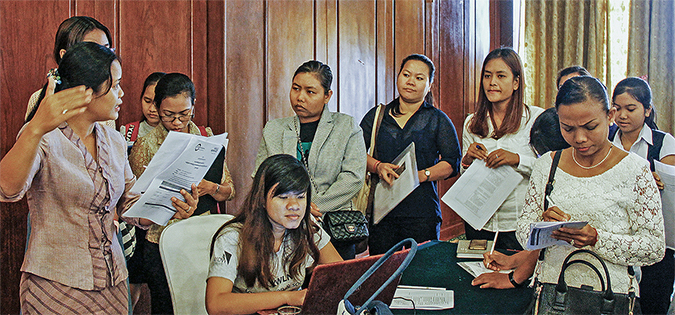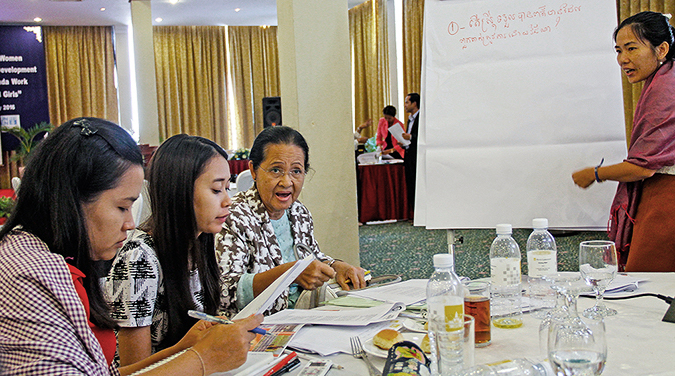The time for realizing the SDGs is now - women’s empowerment at the forefront of the Cambodian agenda
Date:
Author: Mariken Harbitz
The most comprehensive framework on gender equality has been put forward and adopted by all countries in the world. With this in mind, the Third National Conference for Women was arranged in Cambodia to see how the country can go from global to local.
Phnom Penh, Cambodia – As the national anthem is played, a moment of silence shivers through the conference hall where NGO’s, development partners, civil society, media and UN agencies have gathered. Indeed this meeting is about national priorities where gender equality becomes a lived reality in Cambodia by 2030.

Despite some progress, Cambodia has a long way to go before reaching gender equality. The latest human development report shows that the country currently ranks 143 on the gender inequality index. 70 per cent of Cambodian women are engaged in vulnerable employment. Furthermore a UN Women supported study from 2015 on intimate partner violence shows that 1 in 5 Cambodian women have experienced physical and/or sexual violence.
The new development agenda contains 17 goals for development that are considered bolder and more comprehensive than the Millennium Development Goals. They include specific targets and indicators on violence against women, reproductive health and rights, women, peace and security, unpaid work and domestic work. UN Women’s representative Wenny Kusuma highlights the role of women in ensuring not just gender equality, but equality as a whole. “To achieve a world that is more fair and equal, the full empowerment of all women is a prerequisite,” said Kusuma.
“We need to think forward and we need to think together on how we can make the new goals work for the women and girls of Cambodia,” said Chim Manavy, Director of Open Institute. She added that the civil society played a crucial role in achieving the new development agenda. “We want to ensure that women’s rights and gender equality is an aspect that takes place in all parts of society,” she said.
The SDGs will be driven not primarily by governments, but by evolving partnerships between governments, civil society, and the private sector. UN Secretary-General Ban Ki-moon called on governments to ensure enabling environments for Civil Society Organizations (CSOs) to operate: “The role of civil society has never been more important. Soon we will start to implement an inspiring new development agenda, agreed by all the world’s governments.”
“The time is right for Cambodia,” said UN Women’s Programme Advisor Inala Fatimath. “The country has policies in place, it has the commitments made to advance gender equality in the country, and the resources are there. Now we need to transform framework to a lived reality for Cambodian women and girls,” she said.

Moderator for the conference Rathanak Ou emphasized the commitments made by the Cambodian Government during the UN Women led global gender summit, held in 2015 as part of the Step It Up campaign.
“The leaders of Cambodia have committed to invest additional resources in gender equality and they are encouraging women’s empowerment” he said emphasizing that in Cambodia, the will to invest in gender equality is very much present. “With the new election coming up, political parties have been encouraged to support women candidates,” said Ou.
The Step It Up for Gender Equality campaign asks governments to make national commitments to address the challenges that are holding women and girls back from reaching their full potential. Over 90 governments, including Cambodia, has stepped up with commitments made on national level to achieve gender equality.